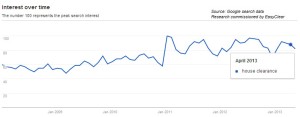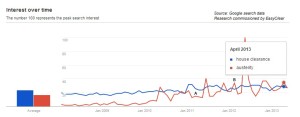{This Wildcard Wednesday brings you a guest blogger, Letizia Scillia, a Digital Marketing Expert in London. She loves writing about everything. You can find more of her articles on searchstarz.com.}
People sell household possessions due to the austerity measures.
Economic crisis and austerity measures cause a crash in the market. However some sectors are more likely than others to survive the crash. Research study shows that the house clearance sector has not been negatively impacted by the unstable economic situation.
From an accurate analysis of the results, we can see a direct relation between austerity measures and the requests for house clearance services. The research study, commissioned by EasyClear, shows how online searches on Google.co.uk for the term “house clearance” increased in the period between January 2008 and May 2013.

Image 1, Number of searches on Google.co.uk for the term “house clearance” between January 2008 and May 2013.
Moreover, analysing the comparison of the searches number of the terms “house clearance” and “austerity”, it shows that each time an austerity measure was approved, the number of searches on Google.co.uk for the term “house clearance” increased.
The research also highlights several examples. In fact, it shows that the total number of UK searches for the term “house clearance” increased when Greece approved an austerity bill to avoid national bankruptcy in February 2012 (letter B in the image 2 above). On the other hand, it shows a decreasing trend of “house clearance” searches in March 2011, when Portugal rejected austerity measures. (letter A in the image 2 above).

Image 2, Comparison between the number of searches on Google.co.uk for the term “house clearance” and the term “austerity”, January 2008-May 2013. The letter A indicates March 2011 while the letter B indicates February 2012.
The research shows a direct impact of austerity measures on the average person’s lifestyle, prompting them to search for different ways to generate money. David Hudson, Managing Director at EasyClear, said “As times get tougher, ordinary citizens fell the squeeze and are forced to raise money to support their families. We have found more people wanting to sell off household possessions, family heirlooms and antiques to earn a bit of money”
In conclusion, the research study shows that local austerity measures impact upon our lives and that the average UK household is also susceptible to wider economic measures in the European Union.

